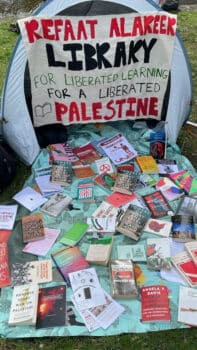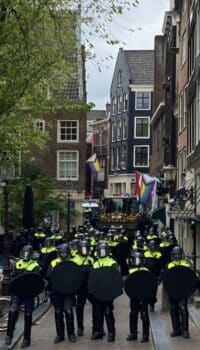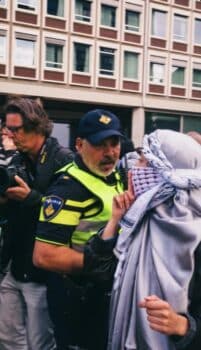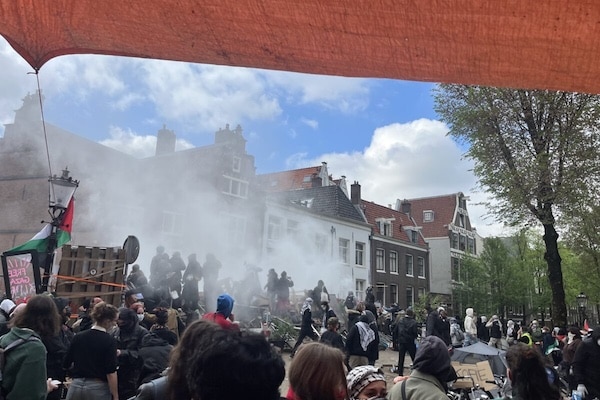Now as part of the staff team at the University of Amsterdam (UvA) who have begun archiving and analysing the huge collection of images, videos and witness testimonies from last week, the scenes from the University of Amsterdam’s campuses evoked images that seem as though they are imitations directly from Palestine. Bulldozers razing the students’ non-violent encampment, demolishing a treasure trove of literature in the students’ library. It was named after the martyred Palestinian writer and poet Refaat Alareer.
The targeting of a library is far from unique and serves as a reminder of the obliteration of Samir Mansour’s bookshop in Gaza in 2021. Whilst the demolition of the students’ tents symbolised the Israeli Occupying Forces (IOF) continued destruction of homes in Palestine, most recently on May 9 in Wadi al-Khalil home to over 300 Palestinian-Bedouins.

Refaat Alareer library at the encampment on May 6
The disproportionate response of the Dutch Police to solidarity marches with the razed student encampment is like revisiting the IOF responses to the Great March of Return demonstrations in 2018. It has been terrifying to watch as a researcher of the UvA. Am I surprised? Unfortunately, no. What we are witnessing in the Netherlands, and in universities everywhere, is the securitisation and weaponization of academia.
However, the police riot at the University of Amsterdam seems to have taken us into the arena of a full militarization of the academy. It reveals how the administration’s continued notion of “safety of the university community” deflects attention away, from the ongoing genocide in Gaza. A genocide the University justifies and actively participates in through its ties with Israeli universities.
The University of Amsterdam peddles the false narrative that the University becomes an ‘unsafe’ space if Palestine is discussed. However, the “unsafe” unravelling in Amsterdam was a result of the CvB’s violent destruction of the non-violence encampment and refusal to negotiate the students’ demands with good faith. Instead, students, staff, and the public in Amsterdam were met with unprecedented levels of violence including beatings, pepper-spray and the unleashing police dogs. People in the peaceful support march or standing on the sidelines to document the excess violence were also aggressively beaten and shoved to the ground. Protesters have reported broken arms and cracked skulls, and much trauma—it is surprising amongst this much force that no student death was reported.
Why has the University Executive Board and the City’s Mayor set such a dangerous precedent and erosion of trust, using undercover police agents who even wore Palestinian Keffiyehs to create deliberate provocations. All this begs the question—whose ‘safety’ is the University trying to protect? In public statements,the university states they want to protect the safety of Jewish students and staff, who are—as they suggest—facing rising levels of antisemitism. Why, then, does the university board send in the police to violently crack down on a demonstration that was co-organized by Jewish students themselves? It seems safety now has everything to do with silencing dissent with Israel’s settler colonial project and economy of death.
Security and Zones of Danger

Police line up on Grimburgal awaiting telephone call from the CvB to enter the student occupation in the Amsterdam Academic Club on May 8
Securitisation in the university is often focused on research whereby, the research is increasingly framed as a security concern. This invokes extraordinary means and procedures in the name of security. We cannot overlook the racial and power aspect of this securitisation. Securitisation is structured not only by Eurocentrism but by whiteness, and the idea that only certain spaces or populations can enter into a “civilised dialogue”. Scholars and students at the University of Amsterdam are aware that the research “zones of danger” tend to be linked precisely to the political and diplomatic conditions of the Netherlands. Simply, research zones are classified based on the Dutch Foreign Office. This is crucial in understanding how the Executive Board at the University choose to turn their university into a battle ground instead of facing the cruel reality of their complicity in the repression of Palestinians.
The securitisation practice has long been problematic and many draw upon Edward Said’s classic Orientalism to discuss this problem, specifically the Western and white superiority it takes as its core. If securitisation were implemented “fairly” many would wonder why only after October 7, was it deemed “unsafe” for University of Amsterdam students to go on exchange to Israeli institutions: specifically the Hebrew University of Jerusalem, University of Tel Aviv, and Ben Gurion University. The Executive Board write “None of these exchanges are currently active due to negative travel advice from the Ministry of Foreign Affairs”.
Important here is to make readers aware of the “unsafe” nature of Hebrew University for one, since its inception. In 1948, the campus was treated as a military base for the Haganah paramilitary. It has continued to build more of its campuses on the ruins of the Palestinian village of Sheikh Bader, and up until writing, the Hebrew University’s water tower serves as a military lookout. Is that really a ‘safe’ campus for the University to send its students on exchange to? Every Israeli university plays an instrumental nation-building and violent role in the Settler Colonial state (see Maya Wind). Despite this, we see the CvB explicitly state that their notion of an “unsafe” campus is one based on the travel advice from the Dutch Government. A Dutch Government which is itself complicit in the Genocide through its export of F-35 fighter jet parts to Israel.
Despite the unwarranted use of state violence imposed on students, staff, and the wider public this week in Amsterdam, will any University come out and say the city is no longer ‘safe?’ “No”—because it sits within such a white “liberal” European country. But were the same events to have happened in Amman or Rabat can we say for certain it would be the same response? I struggle to say “yes”—based on the deeply entrenched xenophobia and Islamophobia within the Netherlands.
It is increasingly clear in the last few months, that narratives and words, are victim to the university obsession with ‘safety’. In her book Erasing Palestine, Rebecca Ruth Gould writes “the role played by checkpoints in the realm of geopolitics is echoed in the realm of political debate by the IHRA definition of antisemitism: both dictate what can and cannot be said, not according to what is right or wrong, but according to who happens to be in power”. The IHRA definition has resulted in the weaponization of antisemitism to deny civil rights rather than fight against antisemitism because even Jewish students and staff have been wrongly labelled antisemitic by critiquing Israel.

May 9, solidarity march in response to police violence
Even more terrifying is that Mark Rutte (Dutch Prime Minister) argued on May 9 that the violent police response was necessary to protect “Dutch Jews” from being blamed for this “violence in Gaza”. This claim is both unjust and puts anti-Zionist, anti-genocide Jews at danger by labelling these individuals, of which many were present at the University encampment, as antisemitic. Similar arguments are used by the University Executive Board in their supposed ‘concern’ for Jewish students and staff. Such manipulation of concern for Jewish students and staff was made crystal clear in the lack of distress at a number being arrested on campus this week.
If we thought there was already a checkpoint created by IHRA definition of antisemitism on speech we were wrong. British Prime Minister Rishi Sunak on May 9 summoned the university vice chancellor to discuss the ‘unacceptable rise in antisemitism’, which illustrates that critics of the state of Israel will soon come under a full blockade. This blockade of acceptable speech seems designed to prevent the further spread of anti-genocide activism.
The University’s claim to care about safety is in reality a concern to maintain power. Power is embodied in the process of knowledge production at its sites of production. Unfortunately, this University would rather have riot police on campus than take action to radically transform the institution and dismantle settler-colonial power. Even more absurd is the University’s claim to ‘neutrality’. If the university is serious about its neutrality, how can it continue to work with institutions that are implicated to the genocide.
Instead, the University has decided it needs to make provisions for war, and more specifically prepare and approve violence on its students and staff. It has chosen not to cut ties. Just like the Palestinian movement, we are ready for this long battle. We are setting up archives to pursue legal claims against the University, police and municipality for repressive measures and state violence. Because ultimately, the Executive Board will soon come to realise that they are not the University. The University is made up of all of us, students and staff, and the will of the University will have its day.
Video Player
May 9, police receive call from CvB to cross the barricade and violently evict the student occupation
Video Player
Students and staff non-violently march Dutch police off UvA campus on May 7 in response to the violent demolition of the student encampment

